November 2022
Corns and Shoes
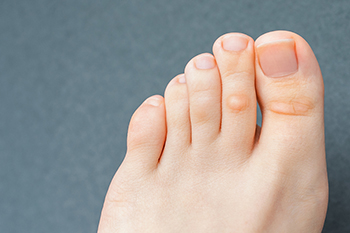
The development of corns on the feet can be an annoyance for a wide variety of individuals across the country. Typically this condition develops in response to the concentration of intense pressure or friction on the foot. The corn itself is made of thick skin. Importantly, there are steps that you might consider taking in caring for your corns. For example, wearing the correct kind of footwear can have a significant impact on the extent to which the corns are being taken care of. By wearing shoes that are ill-fitting, an individual can aggravate the corns. Instead, one might think about wearing shoes that provide the feet with sufficient space to move about in freely. Thus, by choosing to wear the right kind of shoes, a person can sufficiently guard against both the formation and aggravation of corns. If you think that you might have corns, contact a podiatrist today to learn more about what can be done to mitigate and treat the condition.
If you have any concerns regarding your feet and ankles, contact Steven Spivak, DPM of Mount Holly Family Footcare. Our doctor will treat your foot and ankle needs.
Corns: What Are They? and How Do You Get Rid of Them?
Corns can be described as areas of the skin that have thickened to the point of becoming painful or irritating. They are often layers and layers of the skin that have become dry and rough, and are normally smaller than calluses.
Ways to Prevent Corns
There are many ways to get rid of painful corns such as wearing:
- Well-fitting socks
- Comfortable shoes that are not tight around your foot
- Shoes that offer support
Treating Corns
Treatment of corns involves removing the dead skin that has built up in the specific area of the foot. Consult with Our doctor to determine the best treatment option for your case of corns.
If you have any questions please feel free to contact our office located in Lumberton, NJ . We offer the newest diagnostic and treatment technologies for all your foot and ankle needs.
Causes of Peripheral Neuropathy
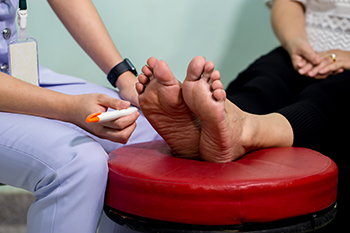
When the nerves that transmit messages from the brain to the feet are damaged, the result is a condition known as peripheral neuropathy. The main symptom is numbness, along with tingling, a burning sensation, and sometimes a sharp shooting pain. Among the many causes of peripheral neuropathy, diabetes is at the top of the list. About half of diabetics develop this condition, which is caused by chronic high blood sugar levels. Because of the numbness, diabetics may not notice sores or cuts on their feet that can become ulcerated. Side effects from medication you may be taking is another well-known cause of peripheral neuropathy. Other causes include genetics, inflammatory infection, autoimmune disease, and kidney disease. Excessive drinking of alcoholic beverages is another common cause. Ignoring symptoms of peripheral neuropathy can be dangerous to your health. If your feet feel numb on a regular basis, it is wise to seek the counsel of a podiatrist as soon as possible for a full examination and an ongoing program of treatment.
Neuropathy
Neuropathy can be a potentially serious condition, especially if it is left undiagnosed. If you have any concerns that you may be experiencing nerve loss in your feet, consult with Steven Spivak, DPM from Mount Holly Family Footcare. Our doctor will assess your condition and provide you with quality foot and ankle treatment for neuropathy.
What Is Neuropathy?
Neuropathy is a condition that leads to damage to the nerves in the body. Peripheral neuropathy, or neuropathy that affects your peripheral nervous system, usually occurs in the feet. Neuropathy can be triggered by a number of different causes. Such causes include diabetes, infections, cancers, disorders, and toxic substances.
Symptoms of Neuropathy Include:
- Numbness
- Sensation loss
- Prickling and tingling sensations
- Throbbing, freezing, burning pains
- Muscle weakness
Those with diabetes are at serious risk due to being unable to feel an ulcer on their feet. Diabetics usually also suffer from poor blood circulation. This can lead to the wound not healing, infections occurring, and the limb may have to be amputated.
Treatment
To treat neuropathy in the foot, podiatrists will first diagnose the cause of the neuropathy. Figuring out the underlying cause of the neuropathy will allow the podiatrist to prescribe the best treatment, whether it be caused by diabetes, toxic substance exposure, infection, etc. If the nerve has not died, then it’s possible that sensation may be able to return to the foot.
Pain medication may be issued for pain. Electrical nerve stimulation can be used to stimulate nerves. If the neuropathy is caused from pressure on the nerves, then surgery may be necessary.
If you have any questions, please feel free to contact our office located in Lumberton, NJ . We offer the newest diagnostic and treatment technologies for all your foot care needs.
Are You Struggling With Embarrassing Sweaty Feet?
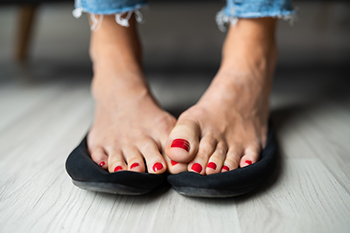
The condition that pertains to people whose feet sweat excessively is referred to as plantar hyperhidrosis. An effective way to gauge if your feet are sweating too much is by how it compromises daily activities. Additionally, many people who are afflicted with this condition are embarrassed by how much their feet sweat, and may refrain from wearing shoes such as flip flops. Additionally, there may be an odor that comes from the feet, and patients can possibly be prone to developing infections and rashes. Plantar hyperhidrosis can develop as a result of the amount of sweat the sweat glands produce, and there are methods that can be implemented that may help to control this. These can include wearing shoes and socks that are made of breathable materials, and it may help to sprinkle powder inside the shoes. Plantar hyperhidrosis can be uncomfortable, and if you have this condition, it is strongly suggested that you consult with a podiatrist who can help you to live your life more comfortably.
If you are suffering from hyperhidrosis contact Steven Spivak, DPM of Mount Holly Family Footcare. Our doctor can provide the care you need to attend to all of your foot and ankle needs.
Hyperhidrosis of the Feet
Hyperhidrosis is a rare disorder that can cause people to have excessive sweating of their feet. This can usually occur all on its own without rigorous activity involved. People who suffer from hyperhidrosis may also experience sweaty palms.
Although it is said that sweating is a healthy process meant to cool down the body temperature and to maintain a proper internal temperature, hyperhidrosis may prove to be a huge hindrance on a person’s everyday life.
Plantar hyperhidrosis is considered to be the main form of hyperhidrosis. Secondary hyperhidrosis can refer to sweating that occurs in areas other than the feet or hands and armpits. Often this may be a sign of it being related to another medical condition such as menopause, hyperthyroidism and even Parkinson’s disease.
In order to alleviate this condition, it is important to see your doctor so that they may prescribe the necessary medications so that you can begin to live a normal life again. If this is left untreated, it is said that it will persist throughout an individual’s life.
A last resort approach would be surgery, but it is best to speak with your doctor to find out what may be the best treatment for you.
If you have any questions please feel free to contact our office located in Lumberton, NJ . We offer the newest diagnostic and treatment technologies for all your foot and ankle needs.
Fractures and High Heels
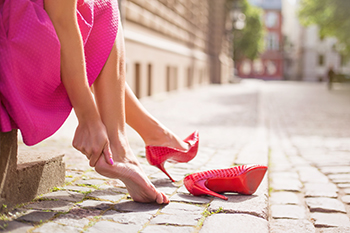
It is certainly no secret that wearing high heels is not healthy for the feet. In fact, it can put them at an increased risk of injury. Wearing high heels puts extreme pressure on the midfoot arch. If a person were to fall wearing high heels, they can cause a fracture in the bones in this area of the foot. When this happens, it is possible for the midfoot to break or dislocate in some way. Most often when a fracture of this nature develops, some individuals might not take it as seriously as they should. This kind of fracture can be quite uncomfortable and cause many complications. In this situation, it is best to contact a podiatrist who can examine your feet and provide you with the most helpful advice and treatment.
High heels have a history of causing foot and ankle problems. If you have any concerns about your feet or ankles, contact Steven Spivak, DPM from Mount Holly Family Footcare. Our doctor can provide the care you need to keep you pain-free and on your feet.
Effects of High Heels on the Feet
High heels are popular shoes among women because of their many styles and societal appeal. Despite this, high heels can still cause many health problems if worn too frequently.
Which Parts of My Body Will Be Affected by High Heels?
- Ankle Joints
- Achilles Tendon – May shorten and stiffen with prolonged wear
- Balls of the Feet
- Knees – Heels cause the knees to bend constantly, creating stress on them
- Back – They decrease the spine’s ability to absorb shock, which may lead to back pain. The vertebrae of the lower back may compress.
What Kinds of Foot Problems Can Develop from Wearing High Heels?
- Corns
- Calluses
- Hammertoe
- Bunions
- Morton’s Neuroma
- Plantar Fasciitis
How Can I Still Wear High Heels and Maintain Foot Health?
If you want to wear high heeled shoes, make sure that you are not wearing them every day, as this will help prevent long term physical problems. Try wearing thicker heels as opposed to stilettos to distribute weight more evenly across the feet. Always make sure you are wearing the proper shoes for the right occasion, such as sneakers for exercising. If you walk to work, try carrying your heels with you and changing into them once you arrive at work. Adding inserts to your heels can help cushion your feet and absorb shock. Full foot inserts or metatarsal pads are available.
If you have any questions please feel free to contact our office located in Lumberton, NJ . We offer the newest diagnostic and treatment technologies for all your foot and ankle needs.
Ways for Seniors to Ease Ankle Pain
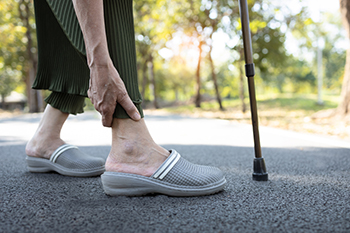
One of the most common complaints among older adults is joint pain, usually the result of osteoarthritis or OA. This degenerative disease is caused by the gradual erosion of the weight-bearing joints, including the ankle. Many sufferers of osteoarthritis take medication to deal with the pain. But experts suggest several practical methods for reducing the effects of OA. First on the list is to maintain healthy body weight. Excessive body weight increases the load on the ankles, which must support that weight when you stand or walk. The second is stretching at the beginning of the day and before beginning any exercise. This helps to reduce muscle stiffness and improve joint flexibility. Stretching can also lower the risk of cramps, sprains, and strains. Low-impact exercise, such as swimming or walking, is also recommended. Finally, to take the weight off the ankles, experts suggest using a walking device. These aids also have the added benefit of improving balance, thereby avoiding falls. Please consult a podiatrist for more information on how to ease the effects of osteoarthritis in the ankles.
Ankle pain can be caused by a number of problems and may be potentially serious. If you have ankle pain, consult with Steven Spivak, DPM from Mount Holly Family Footcare. Our doctor will assess your condition and provide you with quality foot and ankle treatment.
Ankle pain is any condition that causes pain in the ankle. Due to the fact that the ankle consists of tendons, muscles, bones, and ligaments, ankle pain can come from a number of different conditions.
Causes
The most common causes of ankle pain include:
- Types of arthritis (rheumatoid, osteoarthritis, and gout)
- Ankle sprains
- Broken ankles
- Achilles tendonitis
- Achilles tendon rupture
- Stress fractures
- Bursitis
- Tarsal tunnel syndrome
- Plantar fasciitis
Symptoms
Symptoms of ankle injury vary based upon the condition. Pain may include general pain and discomfort, swelling, aching, redness, bruising, burning or stabbing sensations, and/or loss of sensation.
Diagnosis
Due to the wide variety of potential causes of ankle pain, podiatrists will utilize a number of different methods to properly diagnose ankle pain. This can include asking for personal and family medical histories and of any recent injuries. Further diagnosis may include sensation tests, a physical examination, and potentially x-rays or other imaging tests.
Treatment
Just as the range of causes varies widely, so do treatments. Some more common treatments are rest, ice packs, keeping pressure off the foot, orthotics and braces, medication for inflammation and pain, and surgery.
If you have any questions, please feel free to contact our office located in Lumberton, NJ . We offer the newest diagnostic and treatment technologies for all your foot care needs.





